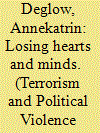| Srl | Item |
| 1 |
ID:
148479


|
|
|
|
|
| Summary/Abstract |
This study explores the local effects of internal armed conflict on postwar violent crime in Northern Ireland. It argues that exposure to wartime violence will lead to higher levels of violent crime in the aftermath of conflict. Particularly, it claims that exposure to violence committed by armed groups challenging the state (anti-government groups) will have this effect, as it erodes the legitimacy needed for local law enforcement agencies to function effectively. This, in turn, is expected to contribute to the emergence of a postwar public security gap that lowers opportunity costs to resort to violent crime for a range of local actors. To evaluate these propositions, spatial statistics on a subnational dataset covering war-related fatalities for the period 1969–98 and police crime records for the postwar period 2002–06 are employed. The results indicate that the more an area has been exposed to violence, and the larger the proportion of this violence committed by anti-government groups, the more violent crime on the local level. This study hence contributes both to the burgeoning literature on the legacies of civil war and to recent research emphasizing the need to disaggregate non-state actors.
|
|
|
|
|
|
|
|
|
|
|
|
|
|
|
|
| 2 |
ID:
190967


|
|
|
|
|
| Summary/Abstract |
Postwar countries often experience high levels of crime. A frequent explanation is that these countries exhibit inefficient and illegitimate state security apparatuses that cannot enforce law and order, and that contribute to an environment conducive to crime. Theoretical arguments outlining how an environment conducive to crime comes about as consequences of armed conflict have remained generic and empirical evidence is scant. Building on theoretical insights from the micro dynamics of civil wars, counterinsurgency policing and environmental criminology, this study makes a contribution by theoretically developing and empirically exploring how local conflict dynamics in insurgent strongholds shape police-community relations in a way that undermines the extent to which the police can handle crime in a postwar context. The suggested causal process is explored in the context of West Belfast (Northern Ireland) from 1969–2008. The analysis indicates overall support for it, though with important nuances.
|
|
|
|
|
|
|
|
|
|
|
|
|
|
|
|